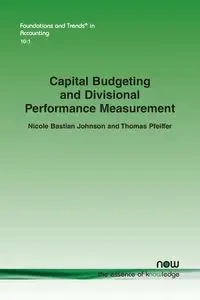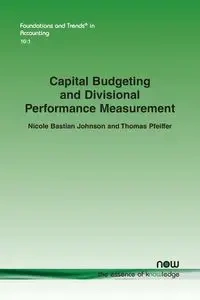Capital Budgeting and Divisional Performance Measurement - Johnson Nicole Bastian
Capital Budgeting and Divisional Performance Measurement - Johnson Nicole Bastian
AutorzyJohnson Nicole Bastian
EAN: 9781680831245
Marka
Symbol
592FAH03527KS
Rok wydania
2016
Elementy
118
Oprawa
Miekka
Format
15.6x23.4cm
Język
angielski

Bez ryzyka
14 dni na łatwy zwrot

Szeroki asortyment
ponad milion pozycji

Niskie ceny i rabaty
nawet do 50% każdego dnia
Niepotwierdzona zakupem
Ocena: /5
Marka
Symbol
592FAH03527KS
Kod producenta
9781680831245
Autorzy
Johnson Nicole Bastian
Rok wydania
2016
Elementy
118
Oprawa
Miekka
Format
15.6x23.4cm
Język
angielski

Capital Budgeting and Divisional Performance Measurement synthesizes recent work on the use of capital budgeting mechanisms to coordinate decentralized investment decisions in multi-division firms with a focus on two-stage investment problems. Divisional managers often have private information about investment profitability that evolves over time and divisional investments can create positive or negative externalities for other divisions at individual investment stages. The authors show that in these circumstances, formal capital budgeting mechanisms that allocate investment costs to divisions via capital charge rates, depreciation schedules, and inter-divisional cost-sharing rules, can yield divisional performance measures that provide proper two-stage investment incentives.
Several recurring themes arise in our analysis. First, positive and negative externalities that arise from divisional investment decisions can cause optimal capital charge rates to deviate substantially from the firm's cost of capital. Second, the optimal inter-divisional cost-sharing rules for shared investments can be approximated by simple rules frequently observed in practice, such as equal cost-sharing or sharing proportional to divisional performance, under sometimes counter-intuitive circumstances. Third, agency costs can change the divisions' investment decisions beyond the standard underinvestment rationing result in two-stage investment problems and can impact the first and second-stage cost charges quite differently. Finally, the analysis shows very broadly that the key components of a two-stage optimal budgeting mechanism, including capital charge rates and inter-divisional cost-sharing rules, can vary significantly across the two investment stages, even when the investment decisions appear to be similar at each stage.
EAN: 9781680831245
EAN: 9781680831245
Niepotwierdzona zakupem
Ocena: /5
Zapytaj o produkt
Niepotwierdzona zakupem
Ocena: /5
Napisz swoją opinię

